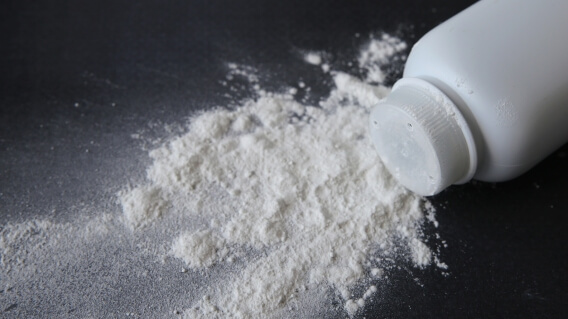Talc Researcher Asks Court to Dismiss J&J Lawsuit Against Her
Legislation & LitigationWritten by Michelle Whitmer | Edited By Walter Pacheco

A medical researcher responsible for uncovering a potential link between talc and cancer has petitioned a judge to dismiss the lawsuit pharmaceutical giant Johnson & Johnson filed against her.
Dr. Jacqueline Moline maintains that her 2019 study linking cosmetic talc products and cancer is sound and protected by the First Amendment.
Moline has served as the plaintiffs’ expert in more than 200 cases against Johnson & Johnson, alleging the company’s talc products caused consumers to develop cancer and mesothelioma, according to Reuters.
A federal court filing in Trenton, New Jersey, states that Moline’s lawyers contend the lawsuit is an effort to “intimidate” scientific experts, Reuters reported.
Moline’s legal team declined to comment to the news agency.
Talc Lawsuits Against Johnson & Johnson
Johnson & Johnson, headquartered in New Brunswick, New Jersey, has faced a growing number of talc lawsuits following the 2019 recall by J&J after traces of asbestos were found in a sample of baby powder.
Currently, J&J faces more than 60,000 lawsuits claiming its talc products caused asbestos-related cancers, including ovarian cancer and mesothelioma.
The company has lost billions in personal injury lawsuits. It has since stopped selling talc-based baby powder and other personal care items in the United States.
Despite the settlements, J&J officials maintain the company’s talc products are safe.
Moline’s Scientific Study in Question
Moline’s 2019 research studied 33 cases of malignant mesothelioma among people who had no known asbestos exposure other than through cosmetic talcum powder.
Asbestos, a highly toxic naturally occurring mineral, can develop throughout talc deposits. Talc is one of the softest minerals in the world, and it’s used in consumer and industrial products alike.
Johnson & Johnson stated recently that it considers Moline’s study to be flawed, according to Reuters. The company claims at least one study participant had additional asbestos exposure and suspects others may have similar exposures, Reuters reported.
That study participant later filed a workers’ compensation claim that appeared to conflict with their court testimony, alleging different asbestos exposure.
Moline revised her paper and stated in court filings that she should not have included that patient, but she maintains the legitimacy of her study, according to Reuters.
Johnson & Johnson’s subsidiary, LTL Management, provided a statement about the lawsuit against Moline.
“LTL’s lawsuit asks a very simple question: Are Dr. Moline’s assertions that 33 mesothelioma patients were only exposed to asbestos through talc true, or did she know they were exposed to asbestos through other means?” LTL officials wrote in the statement. “One federal court has already found she knew that at least one individual had such alternative exposures, and Dr. Moline was recently forced to admit the same about a second.”
J&J Attempts to Resolve Talc Lawsuits
Johnson & Johnson attempted to resolve its talc lawsuits by shifting the burden to LTL Management and filing for bankruptcy. A bankruptcy judge twice tossed the request stating that J&J and LTL were not in the dire financial distress that would warrant bankruptcy proceedings to continue.
J&J appealed the rulings. It offered $8.9 billion to resolve all current and future lawsuits involving talc cancer cases against it. Asbestos lawyers, who are actively taking on new cases against Johnson & Johnson, have claimed the drugmaker’s settlement proposal does not have the support of plaintiffs.







